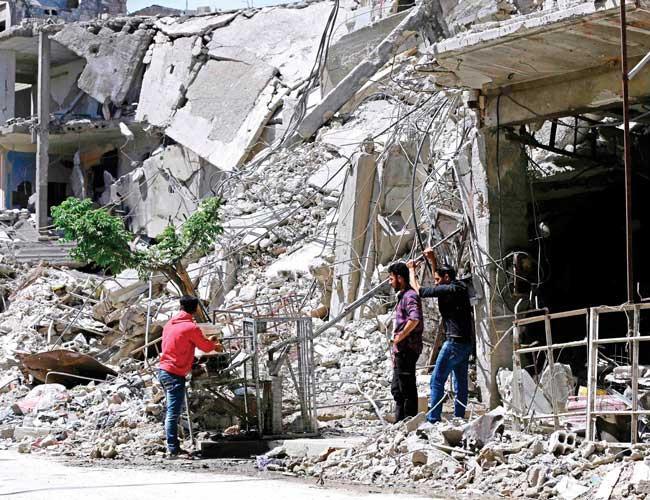
Turkey and the United States have a mutual understanding about each other’s ongoing missions in Syria, the latter’s permanent representative at NATO has said, expressing her belief that the two allies will not be in conflict over this subject.
“We have many talks with Turkey on this subject. I believe that there is now a mutual understanding of our positions. I think that the situation is going to be clear on both sides on what our mission is and what their mission is,” Kay Bailey Hutchison, the permanent representative of the U.S. at NATO told reporters at a press conference on April 27 at the alliance headquarters.
“I think there will be no conflict,” she said a day before NATO foreign ministers will meet at a summit in Brussels.
Her remarks came on questions over unresolved disagreement between the two allies over the U.S. decision to partner with the People’s Protection Units (YPG) in the fight against the Islamic State of Iraq and the Levant (ISIL). Turkey considers the YPG as the offshoot of the outlawed Kurdistan Workers’ Party (PKK) and therefore a terrorist organization and has called on its NATO ally to end its cooperation with this group in Syria.
A number of high-level and technical talks between the two sides has taken place in the recent months but the dismissal of Rex Tillerson from his position as the Secretary of State has caused a delay in a substantial deal on Syria between Ankara and Washington.
CIA director Mike Pompeo was nominated to replace Tillerson but his appointment still needs to be confirmed by the U.S. Congress.
“We are working with Turkey to try—first of all—to assure Turkey that we are doing nothing that would be with a terrorist organization and secondly to assure Turkey that they are our allies. We have no other reason to be in Afrin or anywhere else other than fight ISIS,” the envoy stressed, using another acronym for ISIL.
Afrin is a northwestern Syrian province where Turkey has been conducting a military operation against the YPG presence. Turkey has long been urging that its next target would be the Manbij province of Syria where American troops have been deployed along with the YPG.
Some Turkish officials have been expressing their concerns that U.S. military and political support to the YPG would damage the territorial integrity of Syria.
“We have no interest in changing the borders of Syria in any way that affects Turkey. We are trying to work with Turkey in a way that continues to fight against ISIS. We don’t want to lose the momentum in the fight [against ISIL],” she stressed.
“American troops are in Syria to defeat ISIS,” the envoy said. “This is our sole reason.”
Stoltenberg content on Turkey-US talks over S-400s
NATO Secretary-General Jens Stoltenberg welcomed ongoing efforts by Turkey and the U.S. on the former’s need to augment its anti-ballistic missile system in a question on Ankara’s deal with Moscow to purchase the S-400 system, which cannot be interoperable with the NATO defense system.
Reiterating that Turkey’s decision to enhance its defense with S-400s is a national decision that has led to U.S. concerns, Stoltenberg recalled ongoing talks between Ankara and Washington over the procurement of the Patriot systems. He also recalled that Turkey has been in dialogue with French-Italian Eurosam to develop an anti-ballistic missile system.
“We welcome all these efforts,” he said.
NATO ministers to meet
NATO foreign ministers will come together on April 27 with a heavy-loaded agenda, before the alliance’s July summit. It will also mark the last meeting at NATO’s old headquarters, which is in the process of removal. The defense ministers will meet at the new headquarters just across the old NATO premises, which has served the organization since the mid-1960s.
Russia will be one of the most important topics for NATO, although Stoltenberg expressed his hopes that the NATO-Russia Council could meet in the coming period, especially after the meeting of the two sides’ top soldiers in April.
“When tensions are high, it is even more important to talk with Russia. So NATO remains open to meaningful dialogue. We continue to work towards the next meeting of the NATO-Russia Council,” he said.
Ministers will also discuss the situation in Syria, the Iran deal, and NATO’s plans to scale up training in Iraq. They are expected to agree on further details for a training mission in Iraq, which will be launched at the NATO Summit in July, and to discuss further support for Jordan and Tunisia. Ministers will be joined by the EU’s High Representative for foreign policy Federica Mogherini, in order to discuss how NATO and the EU could cooperate more closely to build stability.